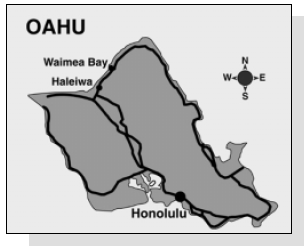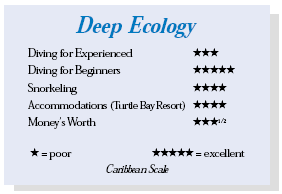Oahu’s North ShoreContents of this Issue: Thumbs Down: Survivor Thailand The Suit Against Peter Hughes Settled Physical Examinations for Divers Skin Diver Magazine Shuts Down Editorial Office: Ben Davison Publisher and Editor Undercurrent 3020 Bridgeway, Suite 102 Sausalito, CA 94965 better than you’ve been led to expect from the October, 2002 issue of Undercurrent
Dear Fellow Diver: As I finned into the lava tubes at Shark’s Cove, I was grateful to be following our dive guides through the labyrinth of swim-throughs and caverns. The extensive tunnel system at Sharks’ Cove is not for beginners -- nor unescorted divers. Eventually Juan and Steve led our group of four divers to the Elevator, a vertical tube that brought us to open water within 15 feet of the surface. In 50-foot visibility, I spotted plenty of the green sea turtles that have again become common in the waters of Oahu’s North Shore. By calmly approaching, I could get great close-up photos and even stroke their shells. Throughout the dive, schools of yellowfin goatfish surrounded me. In the nearby coral heads I found colorful indigenous marine life including lagoon triggerfish and the aptly named psychedelic wrasse. Males have a brown body, orange and blue head, yellow and blue-striped tail; females have a dark brown body with fine white spots and a bright red tail. And here were magnificent Picasso triggerfish, the Hawaiian state fish, known as the humuhumunukunukuapuaa, which means “nose like a pig.” It is featured in the Hawaiian song “I want to go back to my little grass shack...” (a song you are no doubt too young to remember). Star-eye and regal parrotfish added to the color spectrum. Blackside hawk fish that were perched on coral heads dived into them when I approached. By looking closely through the folds of lava rock, I spotted decorator urchins and crabs. My editor, Ben, asked me to write about the north
shore of Hawaii, because most people visiting Oahu hang
around Honolulu and tourist divers don’t venture much
farther. But it’s the north shore where all the beauty is
-- and, I might say, surprisingly decent diving compared with the rest of Oahu. In July, I dived with the conservation- minded Deep Ecology, owned by Pat Johnson, a Pacific Bell retiree. I could gauge the commitment of the DE staff to environmental concerns by the eleven large ghost fish nets from nearby reefs piled behind the dive shop/art gallery. Dozens of photos show DE staff rescuing marine life (nearly forty green sea turtles to date) from fish nets and other flotsam and working to ensure that the Conservation District is kept pristine. DE’s reputation has attracted a few celebrities. Three years ago they certified four new Baywatch Hawaii cast members, babes included. These folks know how to mix business with pleasure. DE’s colorful 22-foot inboard boat (painted on the sides and bottoms with murals of dolphins, turtles, and other critters) took a half-hour to reach Car Wash, one of their sites. The boat holds six divers max, and even with three crew we managed well. Larry, the boat captain and a native Hawaiian, regaled us with tales of his college days at Indiana University and growing up in Hawaii with Don Ho (who still sings “Shiny Bubbles” at the Waikiki Beachcomber Hotel in Honolulu). Twentysix- year-old Juan, a transplanted Mexican who has lived on Oahu since the age of two, is a highly skilled divemaster and ship’s captain. Stuart is a 21-year-old part-Cherokee Hawaiian. This inter-national crew has done hundreds of dives here; gave us complete briefings on topography and sea critters; and allowed plenty of time and space to explore the reef or to take that extra photo. On Larry’s signal we back-rolled off the boat and descended into 70-foot visibility, surrounded by a large school of yellowfin surgeonfish and coils of gently floating red egg casings of the Spanish Dancer. Due to their colorful folds, they are also known as Mermaids’ purses. On the 50-foot bottom, I saw a huge Triton trumpet. Small tropical fish abounded, such as the black and white striped Moorish idol and endemics like the Picasso triggerfish. Car Wash was a turtle haven. I saw at least a dozen green sea turtles during our dive, many in the 2- to-3 foot size. After an hour, I handed my gear to the boat captain and climbed aboard the platform he had lowered. Between dives, we snacked on a light lunch consisting of veggie sandwiches, chips and juices -- protected by the sun roof -- then headed to Atlantis. On the 40-foot depth bottom, I saw plenty of algae growing on coral and lava, suggesting an excess of nutrients, most likely pollution runoff from the island. A turtle came out of one lava cave, and I passed a Spanish dancer floating gracefully along like a bright red handkerchief in the wind. One diver pointed out a pipefish, and I saw plenty of tiger cowries in crevices and lava rocks. This was indeed a critter intense dive, as I also discovered a bright yellow Commerson’s frogfish, which can grow to more than 12 inches. Even with their yellow (or red, orange or brown) color, they can be difficult to spot, as they expertly use their color to blend into their habitat. They move so slowly that they often have algae growing on them as additional camouflage. One afternoon dive here, I found a large Hawaiian hapu’u, or black grouper, lying on the bottom. I just missed putting my hand on a piece of rock that turned out to be a devil scorpionfish, aptly named and extremely well camouflaged by its dull gray color and algae cloak. Spectacled parrotfish nibbled the coral heads. Seemingly-hypnotized stocky hawk fish lounged on their lava rock or coral head perches. Zebra and white mouth morays peered from coral heads, so unconcerned about divers that I could get dramatic close-up pictures. At Spontaneous (depth 60 feet), a magnificent snake eel met me when I first entered the water. One diver found a small Hawaiian lionfish, whose long dorsal and pectoral spines are venomous. I discovered (and left behind) several tiger cowries, one more than four inches in diameter. Nowhere do tiger cowries (and many other shells) reach the size that they do in Hawaii. I also spotted a Hawaiian lobster, which a diver can take in the “r” months. This led Captain Larry to observe that we were diving during “Ju-rye,” and next month was “Aur-gust!” The underwater topography is similar to other Hawaiian islands, with healthy, noncontagious coral reefs, but no soft coral, and without the riot of color that one finds in the south Pacific, or even the Caribbean. But the muted background causes the bright fish to illuminate the landscape. My north shore dives included some disappointments, such as algal growth at Atlantis and Car Wash, and bleached coral at Spontaneous. And, while DE was generally efficient operation, one day we waited more than three hours to depart because the boat’s engine needed a part. Pat apologized and discounted our dive, something few operators would have done. DE led shore dives as well. While one can dive unguided, conditions can catch divers or snorkelers unaware. While I was there, two snorkelers in their mid-30’s drowned when they were caught just outside calm Haunauma Bay. Keep in mind that shore diving is summer sport here. In the winter, 30 foot waves break offshore and the surfers take over. Get a glimpse by renting the recent film “Blue Crush,” which displays all the beauty and excitement of Oahu’s north shore and legendary spots such as Banzai Pipeline, Sunset Beach and Waimea Bay. In the summer those famous waves drop to 2 to 3 feet and you can enjoy underwater scenery not seen by many. The only hotel-resort at the North Shore is Turtle Bay Resort in Kuhuku (about twenty minutes from DE). It’s a full-service resort, with hotel and cottage rooms, two professional golf courses that host the senior PGA tour and the Hawaiian Open, tennis courts, equestrian activities, three swimming pools, informal and formal restaurants, and a poolside bar and lounge. Like many Hawaiian hotels, they offer a special “unadvertised” rate of $139/ room/night to walk-in customers. I got a $973 rate for seven nights, double occupancy, compared with the best rate my travel agent could get: $1694. With this savings, I could easily afford the $200 or so that a mid-sized rental car costs for a week (808-293-8811). DE is next to Café Haleiwa, which has great breakfast fare: a stack of banana or strawberry pancakes is $2. For more upscale dining, Haleiwa Joe’s Seafood and Grill, next to the Anahulu stream bridge, has a dining room overlooking the marina, and serves creative Pacific Rim cuisine at reasonable prices: appetizers include fire shrimp for $9, Ahi spring rolls for $10, summer crab rolls for $7 and smoked ono (wahoo) for $8; entrees include coconut shrimp or prime rib for $20 and grilled salmon with Asian pesto for $18. And, this is America, so the fast food chains are endless. I won’t bore you with what else you can do around Honolulu, other than to say you might luck out and get a magazine and calendar model shoot at breathtaking Lanikai Beach. Just keep in mind that if you’re on Oahu and want to go diving where the savvy locals go, head to the north shore and Deep Ecology. You won’t be disappointed. |

I want to get all the stories! Tell me how I can become an Undercurrent Online Member and get online access to all the articles of Undercurrent as well as thousands of first hand reports on dive operations world-wide
| Home | Online Members Area | My Account |
Login
|
Join
|
| Travel Index |
Dive Resort & Liveaboard Reviews
|
Featured Reports
|
Recent
Issues
|
Back Issues
|
|
Dive Gear
Index
|
Health/Safety Index
|
Environment & Misc.
Index
|
Seasonal Planner
|
Blogs
|
Free Articles
|
Book Picks
|
News
|
|
Special Offers
|
RSS
|
FAQ
|
About Us
|
Contact Us
|
Links
|
3020 Bridgeway, Ste 102, Sausalito, Ca 94965
All rights reserved.

 And while it’s
unlikely that you’ll come to Oahu just
for a diving vacation, it is likely
that at least once in your life you’ll
stay in Honolulu -- perhaps because
your nondiving spouse insists, or
perhaps for a long layover from a
longer trip. So keep the North shore
in mind.
And while it’s
unlikely that you’ll come to Oahu just
for a diving vacation, it is likely
that at least once in your life you’ll
stay in Honolulu -- perhaps because
your nondiving spouse insists, or
perhaps for a long layover from a
longer trip. So keep the North shore
in mind.
 Diver’s Compass: Twotank
boat trips with
light lunch cost $99;
two guided shore dives
were $69 ... Rental
gear is available ...
Nitrox is $15 for two
tanks, and I could
specify the percentage
of oxygen a day ahead ... Standard steel
cylinders were filled from 2700-2900 psi,
which with air gave plenty of time at
these shallow depths ... Deep Ecology is
at 66-456 Kamaehameha Highway, Haleiwa, HI
96712 (808)637-7946,
Diver’s Compass: Twotank
boat trips with
light lunch cost $99;
two guided shore dives
were $69 ... Rental
gear is available ...
Nitrox is $15 for two
tanks, and I could
specify the percentage
of oxygen a day ahead ... Standard steel
cylinders were filled from 2700-2900 psi,
which with air gave plenty of time at
these shallow depths ... Deep Ecology is
at 66-456 Kamaehameha Highway, Haleiwa, HI
96712 (808)637-7946,
